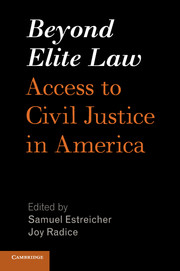Book contents
- Frontmatter
- Contents
- Beyond Elite Law
- Foreword
- List of Contributors
- Overview
- Overview
- PART I CURRENT STATE OF ACCESS TO LEGAL SERVICES
- PART II SOURCES OF LEGAL SERVICES ASSISTANCE FOR WORKING AMERICANS
- PART III FASHIONING A REFORM AGENDA
- 23 New York State Task Force to Expand Access to Civil Legal Services
- 24 New York's 50-hour Pro Bono Requirement
- 25 Starting a “Low Bono” Law Practice
- 26 Toward a More Effective and Accessible Solo and Small Firm Practice Model
- 27 Facilitating Homemade Wills
- 28 Court Facilitation of Self-Representation
- 29 Limited Representation and Ethical Challenges
- 30 Technology Can Solve Much of America's Access to Justice Problem, If We Let It
- 31 Mediation of Employment Disputes at the EEOC
- 32 AAA Consumer Arbitration
- 33 Saturns for Rickshaws: Lessons for Consumer Arbitration and Access to Justice
- 34 Employment Arbitration in the Securities Industry
- 35 FINRA Arbitration and Employment Disputes
- 36 Arbitration as an Employee-Friendly Forum
- 37 Access to Justice in Employment Arbitration: a Critical Look
- 38 Collaborative Technology Improves Access to Justice
- 39 Union Representation in Employment Arbitration
- 40 Legal Representation for New York City's Chinese Immigrant Workers
- 41 Reassessing Unauthorized Practice of Law Rules
- 42 The Pyett Protocol: Collectively-Bargained Grievance Arbitration as a Forum for Individual Statutory Employment Claims
- PART IV CREATING A CULTURE OF SERVICE
- Index
34 - Employment Arbitration in the Securities Industry
from PART III - FASHIONING A REFORM AGENDA
Published online by Cambridge University Press: 05 May 2016
- Frontmatter
- Contents
- Beyond Elite Law
- Foreword
- List of Contributors
- Overview
- Overview
- PART I CURRENT STATE OF ACCESS TO LEGAL SERVICES
- PART II SOURCES OF LEGAL SERVICES ASSISTANCE FOR WORKING AMERICANS
- PART III FASHIONING A REFORM AGENDA
- 23 New York State Task Force to Expand Access to Civil Legal Services
- 24 New York's 50-hour Pro Bono Requirement
- 25 Starting a “Low Bono” Law Practice
- 26 Toward a More Effective and Accessible Solo and Small Firm Practice Model
- 27 Facilitating Homemade Wills
- 28 Court Facilitation of Self-Representation
- 29 Limited Representation and Ethical Challenges
- 30 Technology Can Solve Much of America's Access to Justice Problem, If We Let It
- 31 Mediation of Employment Disputes at the EEOC
- 32 AAA Consumer Arbitration
- 33 Saturns for Rickshaws: Lessons for Consumer Arbitration and Access to Justice
- 34 Employment Arbitration in the Securities Industry
- 35 FINRA Arbitration and Employment Disputes
- 36 Arbitration as an Employee-Friendly Forum
- 37 Access to Justice in Employment Arbitration: a Critical Look
- 38 Collaborative Technology Improves Access to Justice
- 39 Union Representation in Employment Arbitration
- 40 Legal Representation for New York City's Chinese Immigrant Workers
- 41 Reassessing Unauthorized Practice of Law Rules
- 42 The Pyett Protocol: Collectively-Bargained Grievance Arbitration as a Forum for Individual Statutory Employment Claims
- PART IV CREATING A CULTURE OF SERVICE
- Index
Summary
The Federal Industry Regulatory Authority (FINRA) maintains a large arbitration system, under federal regulatory auspices, for brokers and dealers in the U.S. securities industry regarding disputes these firms may have with their investors and employees. Michael Delikat and Lisa Lupion examine how the system operates in employment disputes, both where employees are represented by counsel and where they represent themselves.
The Financial Industry Regulatory Authority (FINRA) is the largest non-governmental self-regulatory organization for brokers and dealers doing business in the United States. FINRA was created on July 30, 2007, through a combination of the National Association of Securities Dealers and the New York Stock Exchange. Among its functions, FINRA operates the largest dispute resolution forum in the securities industry, providing arbitration and mediation services for monetary, business, and employment disputes among investors, securities firms, and the employees of securities firms.
Given the number of the organizations and individuals registered with FINRA, FINRA deals with a large volume of arbitrations each year. In each of the last five years (2008–13), there were anywhere from 4,000 to 7,000 arbitration cases filed. These cases can be broadly categorized as some form of a customer dispute (e.g., disputes between investors and their individual brokers and broker-dealer firms) or some form of an employment dispute (e.g., disputes between individual registered brokers and their employer firms). A wide range of types of controversies fall within these broad categories including margin calls, churning, unauthorized trading, failure to supervise, negligence, omission of facts, breach of contract, breach of fiduciary duty, unsuitability, misrepresentation, discrimination, and compensation disputes.
The majority of the claims filed and the arbitration awards rendered by FINRA would be classified as customer disputes. Nevertheless, because of the professional background of the authors and the important issues raised in employment arbitration, including the arbitration of statutory claims through mandatory arbitration processes, this chapter focuses on the handling of employment disputes in the context of FINRA arbitration. We first consider the rules and procedures that regulate employment arbitrations in FINRA. Next, we look at all of the employment awards issued from January 2009 to December 2012 and offer some conclusions as to how litigants have fared in the forum in a variety of different contexts.
- Type
- Chapter
- Information
- Beyond Elite LawAccess to Civil Justice in America, pp. 506 - 517Publisher: Cambridge University PressPrint publication year: 2016



